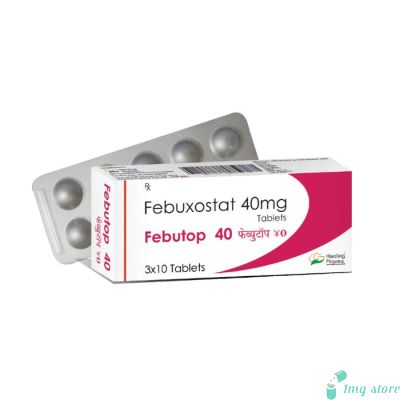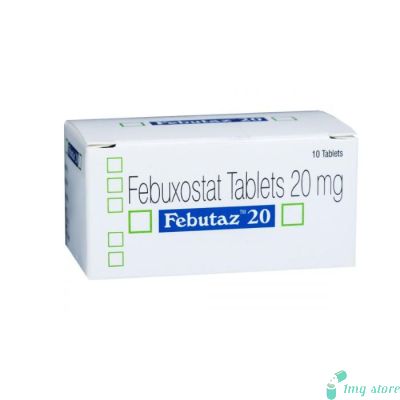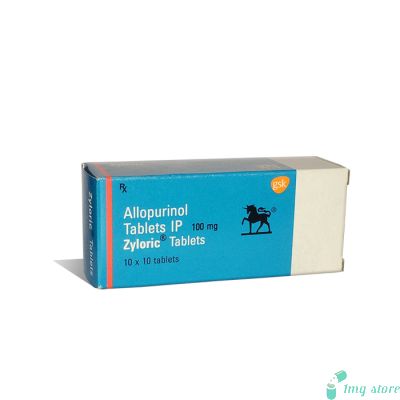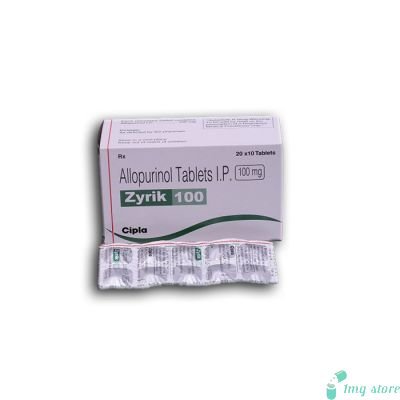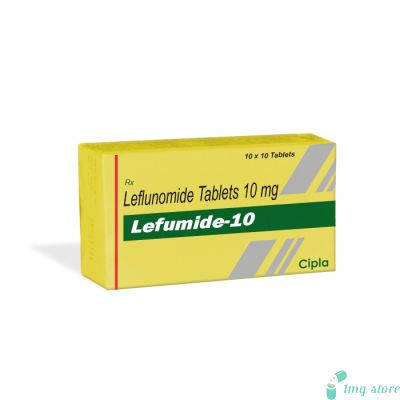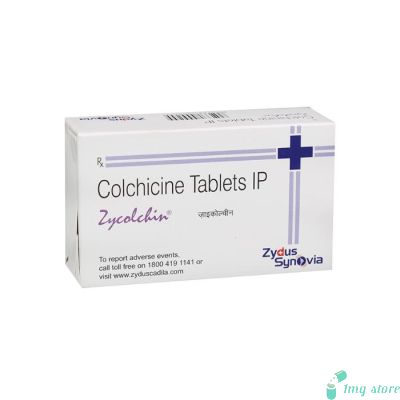Febucip Tablet (Febuxostat)
Buy Febucip Tablet (Febuxostat), Febuxostat is a medication used for the treatment of hyperuricemia, a condition characterized by elevated levels of uric acid in the blood. Febuxostat is marketed under the brand names Febucip and Uloric.
Introduction of Febucip Tablet (Febuxostat)
Febuxostat is a medication used for the treatment of hyperuricemia, a condition characterized by elevated levels of uric acid in the blood. It belongs to a class of drugs known as xanthine oxidase inhibitors. Elevated uric acid levels can lead to the formation of urate crystals in joints and tissues, causing conditions like Gout and kidney stones. Febuxostat works by inhibiting the enzyme xanthine oxidase, which is responsible for the production of uric acid. This helps to lower uric acid levels in the blood and prevent the associated complications. Febucip and Uloric are the brand names for Febuxostat.
Febuxostat Dosage Information:
Dosage Regimen: The recommended starting dose of Febuxostat is usually 40 mg once daily. After a month of treatment, if the desired reduction in uric acid levels is not achieved, the dosage can be increased to 80 mg once daily.
Missed Dose: If you miss a dose, take it as soon as you remember. However, if it's close to the time for the next dose, skip the missed dose and continue with your regular dosing schedule. Do not double the dose to make up for a missed one.
Overdose: In case of an overdose, seek medical attention immediately. Overdosing on Febuxostat can lead to severe adverse effects. Symptoms of overdose may include nausea, vomiting, diarrhea, dizziness, and difficulty breathing.
Febuxostat Tablet Alternatives:
Several alternatives are available for Febuxostat Tablets in the treatment of hyperuricemia and gout:
Allopurinol: Allopurinol is a widely used xanthine oxidase inhibitor that reduces uric acid production. It's effective in preventing gout attacks and managing hyperuricemia.
Probenecid: Probenecid increases uric acid excretion by the kidneys, helping to lower blood uric acid levels. It's often considered for patients who do not tolerate or respond well to other medications.
Colchicine: Colchicine is used to relieve pain and inflammation during acute gout attacks. It's not a uric acid-lowering medication, but it helps manage gout symptoms.
Pegloticase: Pegloticase is used for severe, treatment-resistant gout. It's an enzyme that breaks down uric acid and is administered through intravenous infusion.
Lesinurad: Lesinurad is a medication that enhances uric acid excretion while inhibiting its reabsorption in the kidneys. It's often used in combination with xanthine oxidase inhibitors.
Febuxostat Tablet Price:
Discover competitive and transparent pricing for Febuxostat tablets, a solution for managing conditions like gout. Our platform ensures that you have clear insights into the cost of your healthcare choices. By offering reasonable Febuxostat tablet prices, we aim to provide you with an affordable option to effectively address your gout-related concerns, without compromising on quality or efficacy.
Essential Safety Advice to Follow when Using Febucip Tablet (Febuxostat)
- Allergic Reactions: Inform your healthcare provider of any known allergies before taking Febuxostat. If you experience signs of an allergic reaction such as rash, itching, swelling, or difficulty breathing, seek medical attention immediately.
- Liver and Kidney Function: Individuals with a history of liver or kidney disease should exercise caution while using Febuxostat. Adjustments to the dosage may be necessary.
- Pregnancy and Breastfeeding: Febuxostat/Uloric is not recommended for use during pregnancy or breastfeeding, as its effects on the fetus or nursing infant are not well-established.
- Medication Interactions: Certain medications, such as azathioprine and mercaptopurine, can interact with Febuxostat, potentially leading to adverse effects. Inform your doctor about all medications you are taking.
- Alcohol Consumption: Alcohol intake should be limited while on Febuxostat, as it can interfere with the medication's effectiveness and exacerbate its side effects.
Some of the specific indications for Uloric/Febuxostat Tablets include
- Hyperuricemia: Febuxostat is primarily used to treat hyperuricemia in patients with gout, a type of arthritis caused by the deposition of urate crystals in joints. By lowering uric acid levels, it helps prevent gout attacks and joint damage.
- Gout Management: Febuxostat is also utilized for managing acute gout flares and preventing recurrent gout attacks.
- Kidney Stones: Elevated uric acid levels can contribute to the formation of kidney stones. Febuxostat can be beneficial in reducing the risk of Kidney stone formation by lowering uric acid concentrations.
- Chronic Kidney Disease: Febuxostat may be prescribed to patients with chronic kidney disease and hyperuricemia to mitigate the risk of further kidney damage associated with high uric acid levels.
- Other Conditions: In some cases, Febuxostat might be used off-label for conditions related to elevated uric acid levels, as determined by a healthcare professional.
Some of the Secondary Effects of Febucip Tablet (Febuxostat)
- Common Side Effects: Common side effects of Febuxostat include nausea, joint pain, headache, rash, and abnormal liver function tests.
- Serious Side Effects: Although rare, serious side effects can occur. These include severe allergic reactions, liver problems, cardiovascular events, and Stevens-Johnson syndrome, a severe skin condition.
- Cardiovascular Risk: There have been concerns about an increased risk of cardiovascular events in patients taking Febuxostat. Consult your doctor if you have a history of cardiovascular disease before starting this medication.
- Liver Function: Monitoring of liver function is important during Febuxostat treatment, as it can lead to liver enzyme abnormalities in some individuals.
- Renal Effects: Febuxostat may have an impact on kidney function, especially in patients with pre-existing kidney problems. Regular monitoring of renal function is advised.
Frequently Asked Queries About Febuxostat (Febucip/Uloric):
Q1. Can Febuxostat Be Taken With Other Medications For Gout?
Yes, but certain medications like allopurinol, another type of xanthine oxidase inhibitor, should be used cautiously with Febuxostat due to the increased risk of adverse effects. Consult your doctor to ensure a safe combination.
Q2. Is Febuxostat Safe For Individuals With A History Of Heart Problems?
Febuxostat use has been associated with a potential increase in cardiovascular events. Individuals with heart conditions should discuss their medical history with a healthcare provider before starting Febuxostat.
Q3. Can Febuxostat Be Used To Treat Acute Gout Attacks?
Febuxostat is not typically used to treat acute gout flares. It's more effective in preventing recurrent attacks by lowering uric acid levels over time. Consult your doctor for appropriate treatment options for acute gout attacks.
Q4. Does Febuxostat Cause Weight Gain?
Weight gain is not a common side effect of Febuxostat. However, individual reactions to medications can vary. If you experience unusual weight changes while taking Febuxostat, consult your doctor to determine the cause.
Q5. Can Febuxostat Be Used In Pregnant Or Breastfeeding Women?
Febuxostat is generally not recommended during pregnancy or breastfeeding due to limited safety data. Consult a healthcare provider for alternative options if you are pregnant or breastfeeding while needing treatment for hyperuricemia or gout.
Significant Drug Interactions that Require Attention For Febucip Tablet (Febuxostat)
- Azathioprine and Mercaptopurine: Combining Febuxostat with these medications can increase the risk of bone marrow suppression, which can lead to reduced blood cell production.
- Warfarin: Febuxostat may interact with warfarin, a blood-thinning medication, potentially affecting its anticoagulant effects. Close monitoring of blood clotting parameters is essential.
- Theophylline: Co-administration of Febuxostat and theophylline, a medication used to treat respiratory conditions, can lead to elevated theophylline levels in the blood. Dose adjustments may be necessary.
- Didanosine: Taking Febuxostat and didanosine, a medication used in HIV treatment, together can reduce the absorption of didanosine. These drugs should be taken at different times.
- Other Xanthine Oxidase Inhibitors: Concurrent use of other xanthine oxidase inhibitors with Febuxostat is not recommended, as it can increase the risk of adverse effects without additional benefits.
| Manufacturer | : | Cipla Pharma, India |
| Equivalent Brand | : | Uloric |
| Generic Search | : | Febuxostat |







